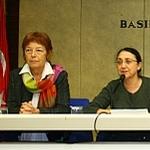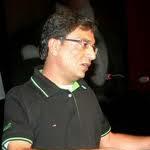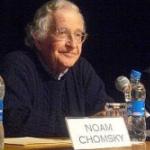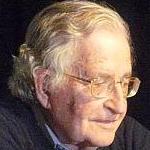The "7th Istanbul Gathering for Freedom of Thought" was held at the Bilgi University Dolapdere campus on Istanbul's European side on Saturday and Sunday (9/10 October). Following the opening speeches, tribute was paid to slain Turkish Armenian journalist and human rights defender Hrant Dink, editor-in-chief of the Armenian Agos newspaper at the time.
Şanar Yurdatapan from the Initiative against Thought Crime lead through the sessions of the international event. About Dink, who was killed on 19 January 2007, he said, "He is still helping us".
"Rights must be re-defined in terms of freedom of expression"
The session on "The role of freedom of expression in the 21st century" was attended by the internationally renowned linguist Noam Chomsky as well as US American expert on international law, Prof. Richard Falk, and Hilal Elver, professor of international law at Stanford University. Tenor of the session was the claim that rights should be re-defined in terms of freedom of expression.
Article 301 should be abolished
The latter event was lead by Prof Turgut Tarhanlı from the Bilgi University School of Law. The initial speech was delivered by Prof. Elver from Stanford who referred to the internet. He pointed out a huge inequality in the utilization of the internet technology which has 2 billion users world-wide. "Freedom of expression is a sort of freedom that not everybody is entitled to due to economic reasons", he said.
Elver emphasized that rights advocators had to intensify their struggle against internet access bans in Turkey in the future. He claimed that article 301 of the Turkish Criminal Law (ban of "insults" to the Turkish state) should be abolished.
Neo-liberal media gives way to neo-fascist statements
Richard Falk said in his speech, "In my opinion, we have to stand up against the spirit of the state even more. We have to focus our political energy on transforming the government that maintains illegal relations with companies", he argued.
"The neo-liberal media allocates more space to neo-fascist statements. The discourse developed for humanity is not represented in the media. Discussions between rightist and libertarian opinions render very unhealthy results in terms of freedom of expression".
"On one hand the internet is a pluralistic discourse but on the other hand it is an interface of commercial exploitation. We have to discuss how the internet as a medium that enables exploitation such as child pornography can be restricted".
Elver and Falk indicated that both companies and states are running huge campaigns of disinformation on the climate change and that the concepts regarding the "right to information", the "right to development", "environmental rights" and "water rights" should be re-defined.
"We can learn from the struggle for freedom in Turkey"
Chomsky started his speech with a quotation from the long hidden preface of George Orwell's book "Animal Farm" reading, "In the free country of England it is possible to restrict speech without resorting to violence".
"The rights that were denied will be granted but it is important how to protect these rights. Improper, unpopular and unsuitable ideas are being suppressed in today's media". "The challenging task of re-establishing freedom of expression lies ahead of us". Chomsky continued:
"Turkey is seeing severe violations of human rights and murders. But in the East of the country there is a culture of resistance that we cannot see. Artists, academics and journalists are contributing to this struggle and pay its price. Turkey can be proud of its struggle for freedom in the past and there is a lot we can learn from them", Chomsky said.
11 Witnesses of lack of freedom in Turkey
Another session of the international meeting conveyed the specific struggles of eleven journalists to a broad audience. They drew attention to the trials opened against them on the grounds of expressing their opinions or their journalistic work.
Journalist and book author Nedim Şener is tried on the grounds of his book on the background of the Dink murder. He said, "The Dink murder case shows how difficult the struggle for justice actually is. All officials on duty during the term of the murder were promoted. They may not be guilty. Yet, if I have to face the judiciary they should do so too".
Radikal newspaper reporter İsmail Saymaz stated that a total of 206 cases were opened against Star newspaper reporter İbrahim Sarp and another 60 trials against Büşra Erdal from Zaman newspaper. Saymaz himself is tried in ten different cases under charges of "violating the secrecy of an investigation" and the "attempt to influence a fair trial". "It is impossible to intimidate journalists. History shows this as well. A clever government should not resort to this", Saymaz argued.
Express reporter Merve Erol, who was convicted together with journalist İrfan Aktan under the Anti-Terror Law (TMY), announced that the punishment was enforced at a time when the government had claimed to give preference to democratization.
Vedat Kurşun, former editor-in-chief of the Kurdish Azadiya Welat newspaper, was also convicted according to the TMY. Other journalists who presented their cases were researcher and author Hülya Tarman, Pınar Selek, Seferi Yılmaz, Mehmet Desde, artist Cevdet Bağca, director Haldun Açıksözlü, conscientious objector İnan Süver, and publisher Mehdi Tanrıkulu. (TK/SP/EÖ/VK)




















